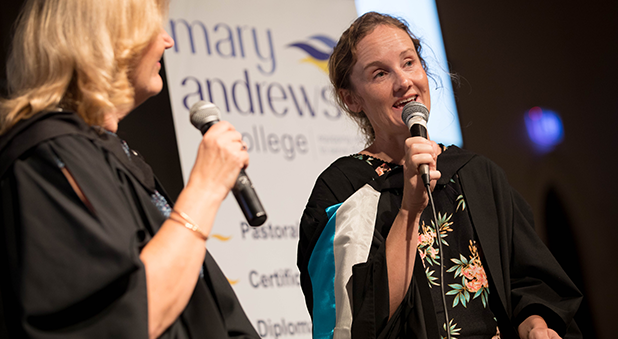Marguerite Robson laughs as she recalls the time she was described as a “pastorally frustrated administrator”. It was while she was working in a church office that her senior minister encouraged her to take what she calls “a leap of faith” and pursue studying to be a community chaplain through Mary Andrews College (MAC).
Community chaplaincy is one of the fastest-growing vocations for Christian workers. Many Christians are seeking the opportunities provided by chaplaincy roles, whether paid or voluntary, to engage with, support and care for the community.
Increasingly, students are enrolling with Mary Andrews College (MAC) to follow the pathway the college provides into community chaplaincy. Already, a number of MAC graduates have been accredited by the Sydney Diocese as community chaplains, following the completion of their certificate or diploma course, which includes several pastoral care units.
Many of the 45 students who graduated from MAC in March this year – the largest graduating class in the college’s 127-year history – are already working in community chaplaincy or pastoral care roles.
Mrs Robson now works two days as a pastoral care worker with Anglicare at Eileen Armstrong House in Woonona, and volunteers one day as a hospital community chaplain. She says the training she received at MAC gave her the strong foundation she needs to care for people.
“The skills and knowledge I have learned is a foundational ‘tool kit’ that has equipped me for chaplaincy ministry, as people seek to be understood, to have meaning and purpose in this life, and to be given the opportunity to be eternally secure,”
“This means I don’t feel like I’ve been thrown in the deep end – my studies have given me a boat, a life vest and 40 days of rations!” she says.
Supportive Conversations
In particular, learning the skill of careful listening has changed Mrs Robson’s approach to supportive conversations. “Being slow to speak and react in ‘other-person centred’ conversations gives people the space to share their joys, needs, loss or grief. Being alert to the timing and flow of conversations, I can now sit in the uncomfortable space of quietness or emotions of grief, learning to leave the biblical response to the end of conversations.”
Nada Appleby is another recent graduate who combined her study with a pastoral care role in her church and surrounding community in the Illawarra, working with youth, women and families.
“I’m continuing in the joy of coming alongside women and youth in sharing God’s word with them,” she says. “I’m also enjoying my chaplaincy role within a local primary school… God has certainly used this time to create in me a burning desire to care effectively so that many may come to know his love and forgiveness through Christ, our perfect friend and counsellor who knows and understands all of our needs and, of course, listens without interrupting!’
Ms Appleby’s training and passion for pastoral care is bearing fruit in her local church at St Stephen’s, Port Kembla, and in the community.
The senior minister of Port Kembla with Warrawong, the Rev Michael Turner says, “Nada’s impact on the church has been a blessing. She’s thrown herself into intergenerational ministry among women. It’s been a delight to see her utilise her training and evident gifting. I’m very thankful to our heavenly Father for Mary Andrews College, in seeing the need here in Port Kembla, and in helping train women for much-needed pastoral ministry.”
MAC’s director of studies, the Rev Jackie Stoneman, is thrilled about the impact college graduates are having in their local communities through chaplaincy work. “It is exciting to see students integrate what they are learning into their lives and to see the importance of loving people,” she says.
“It is exciting to see what God will do through community chaplaincy.”
More information about MAC’s pathway into community chaplaincy


























